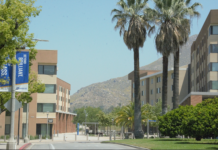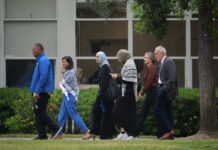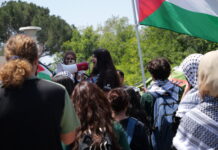
Tears, jubilation and cheers radiated through the crowd of pro-Palestinian student protesters gathered at the University of California, Riverside (UCR) Bell Tower as they heard from student leaders and Chancellor Wilcox that their demands had been meet. Last week, in a scene familiar to college students across the nation, dozens of tents had been erected around the Bell Tower as students built an encampment to pressure administration to satisfy UCR’s chapter of Students for Justice in Palestine’s (SJP) “demand [for] UCR to withdraw from Israel’s apartheid regime.”
By the end of the week, an agreement had been signed between the organizers and campus administration to meet protester demands and end the encampment. For more information regarding the original demands and agreement made between administration and protesters check out “I believe that we will win’: the agreement that ended UCR’s encampment,” by Senna Omar.
The erection of the first tent in the encampment on Monday, April 29, 2024, was the culmination of seven months of protests, sit-ins and walkouts, where organizers attempted multiple times to make contact with administration. UCR’s Students for Justice in Palestine (SJP) president, Hibah Nassar, and lead negotiator on the resolution, Samia Alkam, claim that a lot of communication between them and administration regarding demands were met with no response, bar one specific “one-sided meeting” in which “there may have been listening involved, but never anything receptive.”
Hibah Nassar, SJP President, believed that if administration had met with protest organizers prior to the encampment, the actions of protestors would not have reached that extent. “The only reason why we hosted an encampment on UCR campus is because of the seven months of silence and neglect,” she expressed. Nassar stated that SJP took action in these various forms of protest to “simply to be acknowledged and recognized and heard,” but with no end result, they escalated to hosting an encampment to have their “demands be met by administration.”
On the first day of encampment, Lead Negotiator on the agreement, Samia Alkam, delivered a letter to administration at 11 a.m. laying out the protestor’s demands. Within a few hours of the initial contact, an email was sent by UCR Chancellor Kim A. Wilcox to all students acknowledging that “The suffering in Gaza since the start of this war has been unimaginable — more than 30,000 deaths, millions of people displaced, and hunger that is bordering on famine.” With this statement, Alkam believed that Chancellor Wilcox “end[ed] his silence on the death toll [in Gaza].”
At the same time, the Chancellor’s email also established restrictions on the encampment, setting out rules that reminded protestors they would have to comply with campus policy: large signs and banners would be taken down; chalk writing on the ground at and around the Bell Tower must be removed; and blocking access to any part of campus would not be allowed.
The tide turned on Tuesday when administration responded to an email from negotiation lead Alkam, scheduling a meeting between leaders of the encampment and administration for the following day. Taking place on Wednesday, May 1, 2024, the first official negotiation, according to Alkam, was said to be around an hour long, and involved Chancellor Wilcox, Provost and Executive Vice Chancellor Elizabeth Watkins, and Vice Chancellor of Student Affairs Gerry Bomotti.
Negotiations continued until Thursday, May 2, 2024 where after eight hours of negotiation, the protest leaders reached an agreement with the administration to end the encampment in return for certain concessions from the University. According to Alkam, the negotiators for the protestors tried to “make the best decision possible to yield the most amount of material change” with what leverage they had, and felt that they were able to reach an agreement that was to their benefit.
Delving into the process, Alkam believed that UCR’s vision of itself as the “most diverse, most social justice oriented, most progressive UC,” gave negotiators leverage over the administration,“ and that this reputation was put at risk when students in encampments were claiming that “[the university is] complicit in genocide.”
For the protestors, the main goal during the negotiation process, according to Alkam, was to make sure that “as many material wins as possible” were made. Elaborating on this, Alkam declared that “our encampment was a success, because in our negotiations, we stood firm on disclosure and stood firm on so many points” but that there is “bureaucratic red tape associated with those and we were realistic about the timelines.”
UCR set a large precedent for actions by UC administration in regards to pro-Palestinian efforts. Commenting on external pressure set upon UCR administration, Alkam believes the outcome of the encampment at UCR “is not something [UC Regents] want for other UCs right now, and I want to continue pushing and advocating. I want our university to be recognized as a leader in this conversation.” Moving forward, Alkam thinks of the goals as “a collective win for us. A collective win for Palestine. I want them to continue pushing and I want us to support each other.
“When we get those outside pressures, but the university stands firmly against those outside pressures and decides to stand with us anyway, that’s a really important look for us. “It’s a really important message to send to other universities that we rose above, and we’d like for them to rise above as well.”
In the end, the agreement brokered between the organizers and administrators was not a one-person effort. Reflecting on the events of the past academic year, Alkam stated “I just want to say that this was a community effort and we thank everybody who’s involved. I want to give a special thank you to MECHA. And a special thank you to ASUCR, especially external for their walkout, and I want to thank every single student who’s involved in the encampment. I think it’s really important for us. I have so much gratitude for the people who made this happen.” Deals were met in regards to demands due to the sheer “number of students who showed up and who support[ed] it.”
Alkam continued, “I really invite anybody who’s passionate, who’s supported the encampment, to continue being involved with SJP here on campus, and to continue making sure that we place the right pressure on our administration to continue meeting our demands because the fight isn’t over. The fight isn’t going to be over until Palestine is free. Thank you so much”
Multiple questions were sent to the University Communications team, some of which included topics such as what communication had looked like over the year in regards to the pro-Palestinian protestors, what discussion looked like in the meeting about the demands set by protestors, and an opportunity to provide general comment. In response, the Senior Director of News & Content of the University Relations team, John Warren, cited the general announcement which was sent to all students at the university.
The announcement stated, “Since Wednesday, several UC Riverside campus leaders have been meeting with the leaders of the student encampment on campus. These meetings have been productive, civil, and representative of multiple points of view on how to reach a resolution” in regards to how communication has looked since the encampments had gone up.







